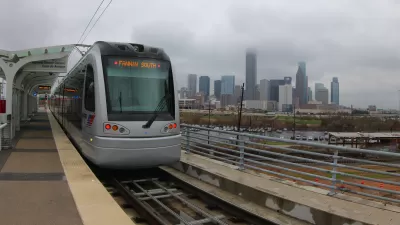The influx of federal emergency money used to keep public transit operational during the COVID pandemic will end this year. States and transit agencies across the country are searching for alternative funding sources.

State governments are trying to fill the gap in public transit funding left as the federal emergency money that kept them afloat dries up. “The fiscal cliff that public transit has been warning about has arrived,” writes Shirleen Guerra, reporter for the Center Square.
“The American Rescue Act Plan of 2021 included $30.5 billion in federal funding for transit agencies. The Coronavirus Aid, Relief, and Economic Security (CARES) Act set aside $25 billion for transit agencies,” the article states. But those funds end later this year.
States are taking a variety of approaches to make up the difference. Massachusetts and Pennsylvania are directly funding transit directly via their 2024-2025 budgets. The budget signed by Massachusetts Gov. Maura Healey last month doubled the amount of money for the Massachusetts Bay Transit Authority from $127 million to $314 million. Meanwhile, Pennsylvania Gov. Josh Shapiro’s proposed budget would increase the state share for public transit funding by 1.75 percent to $282.8 million investment.
In some states, “federal COVID emergency money transit has relied on will be replaced by other sources of federal dollars,” writes Guerra. In Colorado and Michigan, that will come in the form of funding from the 2021 Infrastructure Investment and Jobs Act.
Some transit agencies are turning directly to taxpayers for additional revenue, with mixed success. The mayor of Orange County, Florida, Jerry Demings, has floated the idea of a 2024 ballot measure to increase sales tax to help fund the Central Region Transportation Authority (LYNX) near Orlando, despite the fact that voters rejected a similar measure in 2022.
FULL STORY: Transit searches for ways to replace billions in federal emergency money

Alabama: Trump Terminates Settlements for Black Communities Harmed By Raw Sewage
Trump deemed the landmark civil rights agreement “illegal DEI and environmental justice policy.”

Planetizen Federal Action Tracker
A weekly monitor of how Trump’s orders and actions are impacting planners and planning in America.

The 120 Year Old Tiny Home Villages That Sheltered San Francisco’s Earthquake Refugees
More than a century ago, San Francisco mobilized to house thousands of residents displaced by the 1906 earthquake. Could their strategy offer a model for the present?

Opinion: California’s SB 79 Would Improve Housing Affordability and Transit Access
A proposed bill would legalize transit-oriented development statewide.

Record Temperatures Prompt Push for Environmental Justice Bills
Nevada legislators are proposing laws that would mandate heat mitigation measures to protect residents from the impacts of extreme heat.

Downtown Pittsburgh Set to Gain 1,300 New Housing Units
Pittsburgh’s office buildings, many of which date back to the early 20th century, are prime candidates for conversion to housing.
Urban Design for Planners 1: Software Tools
This six-course series explores essential urban design concepts using open source software and equips planners with the tools they need to participate fully in the urban design process.
Planning for Universal Design
Learn the tools for implementing Universal Design in planning regulations.
Clanton & Associates, Inc.
Jessamine County Fiscal Court
Institute for Housing and Urban Development Studies (IHS)
City of Grandview
Harvard GSD Executive Education
Toledo-Lucas County Plan Commissions
Salt Lake City
NYU Wagner Graduate School of Public Service





























